Anti Corruption
- 格式:doc
- 大小:26.00 KB
- 文档页数:1
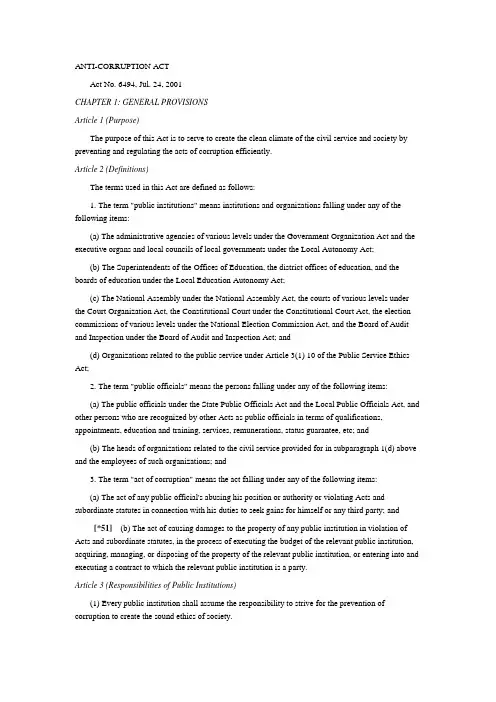
ANTI-CORRUPTION ACTAct No. 6494, Jul. 24, 2001CHAPTER 1: GENERAL PROVISIONSArticle 1 (Purpose)The purpose of this Act is to serve to create the clean climate of the civil service and society by preventing and regulating the acts of corruption efficiently.Article 2 (Definitions)The terms used in this Act are defined as follows:1. The term "public institutions" means institutions and organizations falling under any of the following items:(a) The administrative agencies of various levels under the Government Organization Act and the executive organs and local councils of local governments under the Local Autonomy Act;(b) The Superintendents of the Offices of Education, the district offices of education, and the boards of education under the Local Education Autonomy Act;(c) The National Assembly under the National Assembly Act, the courts of various levels under the Court Organization Act, the Constitutional Court under the Constitutional Court Act, the election commissions of various levels under the National Election Commission Act, and the Board of Audit and Inspection under the Board of Audit and Inspection Act; and(d) Organizations related to the public service under Article 3(1) 10 of the Public Service Ethics Act;2. The term "public officials" means the persons falling under any of the following items:(a) The public officials under the State Public Officials Act and the Local Public Officials Act, and other persons who are recognized by other Acts as public officials in terms of qualifications, appointments, education and training, services, remunerations, status guarantee, etc; and(b) The heads of organizations related to the civil service provided for in subparagraph 1(d) above and the employees of such organizations; and3. The term "act of corruption" means the act falling under any of the following items:(a) The act of any public official's abusing his position or authority or violating Acts and subordinate statutes in connection with his duties to seek gains for himself or any third party; and[*51](b) The act of causing damages to the property of any public institution in violation of Acts and subordinate statutes, in the process of executing the budget of the relevant public institution, acquiring, managing, or disposing of the property of the relevant public institution, or entering into and executing a contract to which the relevant public institution is a party.Article 3 (Responsibilities of Public Institutions)(1) Every public institution shall assume the responsibility to strive for the prevention of corruption to create the sound ethics of society.(2) In the event that any public institution deems it necessary to eliminate legal, institutional, or administrative inconsistencies or to improve other matters for the prevention of corruption, it shall promptly improve or rectify the foregoing.(3) Based on such reasonable means as education and publicity, every public institution shall make strenuous efforts to raise the consciousness of its employees and citizens to stamp out corruption.(4) Every public institution shall aggressively work to promote international exchanges and cooperation for the prevention of corruption.Article 4 (Responsibilities of Political Parties)(1) Political parties that are registered in accordance with the Political Parties Act and members affiliated with such political parties shall endeavor to create a clean and transparent culture of politics.(2) Political parties and members affiliated with such political parties shall have a proper culture of election take root and shall operate themselves and raise and spend political funds in a transparent manner.Article 5 (Duties of Private Enterprises)Private enterprises shall establish a sound order of trade as well as business ethics and take steps necessary to prevent every corruption.Article 6 (Duties of Citizens)Every citizen shall fully cooperate with public institutions in policy steps taken by them to prevent corruption.Article 7 (Obligation of Public Officials to be Clean-Handed)Every public official shall abide by Acts and subordinate statutes, perform his duties fairly and hospitably, and refrain from committing any act of corrupting himself or losing his dignity.[*52]Article 8 (Code of Conduct for Public Officials)(1) The code of conduct that the public officials have to observe in accordance with Article 7 shall be prescribed by the Presidential Decree, the National Assembly Regulations, the Supreme Court Regulations, the Constitutional Court Regulations, or the National Election Commission Regulations.(2) The code of conduct for the public officials referred to in paragraph (1) above shall prescribe matters falling under each of the following subparagraphs:1. Matters concerning the prohibition and limitation of the act of any public official's receiving entertainment, money, goods, etc. from any person related to his duties;2. Matters concerning the prohibition and limitation of the act of any public official's intervening in personnel affairs or concessions or using his good offices or soliciting another person for his good offices, taking advantage of his position;3. Matters to be observed by the public officials to create a sound climate of the civil service, including fair personnel administration; and4. Other matters necessary to prevent corruption and maintain the clean-handedness and dignity of the public officials when they perform their duties.(3) If any public official violates the code of conduct for the public officials referred to in paragraph (1) above, a disciplinary measure may be taken against him.(4) Kinds of, procedures for, effect, etc. of the disciplinary measure referred to in paragraph (3) above shall be governed by Acts and subordinate statutes that prescribe matters concerning the disciplinary measures of administrative agencies to which the relevant public officials belong.Article 9 (Guarantee of Livelihood for Public Officials)The State and local governments shall labor to guarantee the livelihood of the public officials in order for them to devote themselves to the civil service and shall take necessary steps to improve their remunerations and treatments.CHAPTER 2: ANTI-CORRUPTION COMMISSIONArticle 10 (Establishment)An Anti-Corruption Commission (hereinafter referred to as the "Commission") shall be set up under the President to revamp Acts and [*53]subordinate statutes, institutions, etc. and to formulate and implement policies -- all necessary to prevent corruption.Article 11 (Functions)The Commission shall perform the work falling under each of the following subparagraphs:1. The work of formulating and recommending policies and institutional improvement measures to prevent corruption in the public institutions;2. The work of surveying the actual state and evaluating the progress of the policy steps taken to prevent corruption in the public institutions;3. The work of working out and implementing the education and publicity schedule for the prevention of corruption;4. The work of supporting activities carried out by nonprofit civic organizations to prevent corruption;5. The work of promoting international cooperation for the prevention of corruption;6. The work of receiving whistle-blowings, etc. with respect to an act of corruption;7. The work of protecting and recompensing whistle-blowers; and8. The work of addressing matters that the President puts on the agenda of the Commission to prevent corruption.Article 12 (Composition of Commission)(1) The Commission shall consist of 9 members, including 1 chairman and 2 standing members.(2) The chairman and members shall be the persons of profound learning and experience in the corruption question and shall be appointed or commissioned according to the qualification standards set by the Presidential Decree.(3) The chairman and standing members shall be appointed by the President and the non-standing members shall be appointed or commissioned by the President. In this case, 3 members shall beappointed or commissioned on the recommendation of the National Assembly and 3 members, on the recommendation of the Chief Justice of the Supreme Court, respectively.(4) The chairman and standing members shall each come from officials of political service.(5) If any member becomes vacant, a new member shall be appointed or commissioned without any delay.[*54]Article 13 (Chairman)(1) The chairman shall represent the Commission.(2) When the chairman is unable to discharge his duties as such for unavoidable reasons, a standing member designated by the chairman shall act on behalf of the chairman in discharging his duties.Article 14 (Disqualification of Members)(1) A person falling under any of the following subparagraphs shall not be qualified as a member:1. A person who is not a citizen of the Republic of Korea;2. A person who falls under each subparagraph of Article 33 of the State Public Officials Act;3. A person who is affiliated with a political party as a member; and4. A person who registers himself as a candidate to run in an election held in accordance with the Act on the Election of Public Officials and the Prevention of Election Malpractices.(2) Any member shall, when he falls under any subparagraph of paragraph (1) above, rightly resign his seat.Article 15 (Independence of Work and Guarantee of Positions)(1) The Commission shall independently perform the work belonging to its authority.(2) The terms of office for the chairman and members shall each be 3 years and they may be reappointed or recommissioned only once.(3) No member shall be dismissed or decommissioned against his will except for the case falling under any of the following subparagraphs:1. Where he falls under any subparagraph of Article 14(1); and2. Where he has much difficulty in performing his duties on the grounds of mental or physical trouble.(4) In case of a member falling under paragraph (3)2 above, the President shall dismiss or decommission him on the recommendation of the chairman after going through a resolution thereof with the consent of not less than two thirds of the total members.Article 16 (Resolution of Commission)The meeting of the Commission shall be held by the attendance of a majority of its registered members and resolve with the concurrent vote of a majority of those present.[*55]Article 17 (Subcommittees)Subcommittees may be established by specific fields in the Commission to efficiently perform its work.Article 18 (Expert Members)(1) The chairman may appoint experts in the academia and social organizations and other experts on the related field as expert members of the Commission, as reasonably deemed necessary, to efficiently support the Commission's work and conduct specialized studies.(2) The chairman shall appoint or commission expert members after going through a resolution of the Commission.Article 19 (Establishment of Secretariat)(1) The Commission shall establish a secretariat to deal with administrative affairs of the Commission.(2) The secretariat shall have its head and other necessary staff.(3) A standing member designated by the chairman shall concurrently serve as the head of the secretariat who takes charge of dealing with administrative affairs of the Commission and instructing and supervising the staff under the chairman's direction.Article 20 (Advice for Institutional Improvements)(1) The Commission may, if necessary, urge the heads of public institutions to make institutional improvements for the prevention of corruption.(2) The head of any public institution shall, upon receipt of the advice on the institutional improvements under paragraph (1) above, reflect such advice in its effort for the institutional improvements and inform the Commission of the result of steps taken according to the advice. (3) In the event that the head of any public institution who has been advised to make institutional improvements under paragraph (1) above finds it difficult to take steps as advised by the Commission, he shall inform the Commission thereof.Article 21 (Hearing of Opinions, etc.)(1) In performing the functions provided for in Article 11, the Commission may take steps falling under each of the following subparagraphs, as necessary:1. A request to any public institution for explanation or the submission of materials, documents, etc., and a survey of the actual condition thereof; and2. A request to any interested person, any reference person, or any public official involved for his presence and his statement of opinion.[*56](2) The Commission shall be prohibited from taking steps provided for in paragraph (1) above with respect to the matters falling under each of the following subparagraphs:1. Matters concerning the confidential information of the State;2. Matters concerning the appropriateness of an investigation, trial, and execution of sentence (including any security measure, any security surveillance measure, any protective detention measure, any probation measure, any protective internment measure, any custodial treatment measure, and anycommunity service order), or matters on which an audit and inspection have been launched by the Board of Audit and Inspection;3. Matters brought for an administrative adjudication or litigation, an adjudication of the Constitutional Court, a constitutional petition, an examination request filed with the Board of Audit and Inspection, and other procedures for protest and remedy that are in process under other Acts;4. Matters concerning procedures for mediating interests among parties concerned, including reconciliation, good offices, mediation, and arbitration, that are in process under Acts and subordinate statutes; and5. Matters made definite by a judgment, decision, adjudication, reconciliation, mediation, arbitration, etc. or other matters on which the Audit and Inspection Commission has resolved in accordance with the Board of Audit and Inspection Act.(3) The steps of each subparagraph of paragraph (1) above shall be limited to the scope necessary for the Commission to perform its work provided for in each subparagraph of Article 11 and attention shall be paid not to hamper the performance of duties by any public institution.(4) The head of any public institution shall sincerely comply with the request for the submission of materials and cooperate in surveying the actual condition under paragraph (1) above.(5) The head of any public institution may get his officials or relevant experts to be present at the Commission to state their opinions or to submit relevant materials in connection with institutional improvements, etc.Article 22 (Confidentiality)The incumbent or former members, expert members, and staff of the Commission and any other person who is or has been seconded to the Commission or commissioned by the Commission to perform the work of the Commission shall be prohibited from divulging any confidential information that they have acquired while performing the work of the Commission.[*57]Article 23 (Legal Fiction as Public Officials in Application of Penal Provisions)Members and expert members of the Commission who are not public officials shall be deemed public officials in the application of the Criminal Act and the penal provisions of other Acts in connection with any malfeasance regarding the work of the Commission.Article 24 (Organization and Operation)Necessary matters concerning the organization and operation of the Commission except for matters provided for in this Act shall be prescribed by the Presidential Decree.CHAPTER 3: WHISTLE-BLOWING OF ACT OF CORRUPTION AND PROTECTION OF WHISTLE-BLOWERSArticle 25 (Whistle-Blowing of Act of Corruption)Any person who becomes aware of an act of corruption may whistle-blow such act of corruption to the Commission.Article 26 (Obligation of Public Officials to Whistle-Blow Act of Corruption)A public official shall, in the event that he learns an act of corruption committed by another public official or he is forced or proposed by another public official to commit an act of corruption,whistle-blow without any delay such fact to any investigative agency, the Board of Audit and Inspection, or the Commission.Article 27 (Obligation of Whistle-Blowing in Good Faith)In the event that any person whistle-blows an act of corruption in spite of the fact that he knew or should have known the contents of his whistle-blowing were false, he shall not be entitled to the protection of this Act.Article 28 (Method of Whistle-Blowing)Any person who intends to whistle-blow an act of corruption shall make such whistle-blowing in a document stating matters concerning his name, address, occupation, etc., the purport of hiswhistle-blowing, and reasons therefor, and present the object of his whistle-blowing and evidence attesting the act of corruption along with such document.[*58]Article 29 (Handling of Whistle-Blowings)(1) The Commission may, upon receipt of a whistle-blowing, confirm the matters falling under each of the following subparagraphs from the whistle-blower:1. Matters necessary to specify the contents of the whistle-blowing, such as the name, address, occupation, etc. of the whistle-blower and the details and purport of his whistle-blowing; and2. Matters concerning whether the contents of whistle-blowing fall under any subparagraph of Article 21(2).(2) The Commission may ask any whistle-blower to submit necessary materials within the scope of ascertaining the truth of the matters specified in paragraph (1) above.(3) If it is necessary to conduct an investigation into a received whistle-blowing, the Commission shall refer such case to a competent organization (hereinafter referred to as an "investigative agency") among the Board of Audit and Investigation, an investigative agency, or an agency in charge of supervising the relevant public institution (referring to the relevant public institution in case that such agency is nonexistent).(4) In the event that a person suspected of committing the act of corruption on which the Commission has received a whistle-blowing is a high-ranking public official falling under each of the following subparagraphs and contents of his suspected act of corruption require an investigation for criminal punishment and an institution of public prosecution, the Commission shall file an accusation with the prosecution against him in its name:1. A public official with the rank of Vice Minister or higher;2. The Special Metropolitan City Mayor, Metropolitan City Mayor, or Do governor;3. A police officer with the rank of superintendent general or higher;4. A judge or a public prosecutor;5. A military officer with the rank of general; and6. A member of the National Assembly.(5) The prosecution shall, upon receipt of an accusation filed under paragraph (4) above, notify the Commission of the findings of its investigation. The same shall also apply to a case where the case on which the Commission has filed an accusation is already under investigation or related with another case under investigation.Article 30 (Handling of Findings of Investigation)(1) The investigative agency shall conclude its audit, investigation, or examination of a case within 60 days from the date on [*59]which it is referred with a whistle-blowing thereon: Provided, That if there are justifiable grounds, the period of 60 days may be extended and the investigative agency shall notify the Commission of the grounds of such extension.(2) The investigative agency to which a whistle-blowing is referred under Article 29 shall notify the Commission of the findings of audit, investigation, or examination thereof within 10 days from the date on which it concludes such audit, investigation, or examination. In this case, the Commission shall, upon receipt of such report, immediately inform the relevant whistle-blower of a summary of the findings of the audit, investigation, or examination.(3) The Commission may, if necessary, ask the investigative agency to explain the findings on which the agency has made notification under paragraph (2) above.(4) When the audit, investigation, or examination conducted by the investigative agency is deemed inadequate, the Commission may ask the investigative agency to launch again the audit, investigation, or examination by presenting reasonable grounds, such as the submission of new evidential materials, within 14 days from the date on which it is notified of the findings thereof. Any whistle-blower who is informed of a summary of the findings of the audit, investigation, or examination under the later part of paragraph (2) above may file an objection with the Commission regarding the findings of the audit, investigation, or examination.(5) The investigative agency that is requested to launch again the audit, investigation, or examination shall notify the Commission of the findings of such further audit, investigation, or examination within 7 days from the date on which it concludes the audit, investigation, and examination. In this case, the Commission shall, upon receipt of the findings of such audit, investigation, or examination, immediately inform the whistle-blower of a summary of the findings of such audit, investigation, or examination that has been launched again.Article 31 (Application for Adjudication)(1) In the event that a person suspected of committing the act of corruption under Article 29(4) and (5) falls under Articles 129 through 133 and 355 through 357 of the Criminal Act (including the case of aggravated punishment under other Acts) and that the Commission directly files an accusation with the prosecution against him, if the same case as the one for which the accusation is filed is already under investigation or is related to another case under investigation and a public prosecutor concerned serves a notice on the Commission that he does not [*60]institute a public prosecution against either of the two cases, the Commission may file an application for an adjudication on the right or wrong thereof with the High Court corresponding to the High Public Prosecutor's Office to which the public prosecutor belongs within 10 days from the date the Commission receives such notice.(2) Articles 260(2), 261, 262 and 263 through 265 of the Criminal Procedure Act shall apply mutatis mutandis to the application for the adjudication referred to in paragraph (1) above.(3) When the District Public Prosecutor's Office or the District Public Prosecutor's Branch Office to which the public prosecutor belongs under Article 260(2) of the Criminal Procedure Act receives the application for the adjudication of paragraph (1) above, the statute of limitation for prosecution thereof shall be suspended during the period from receipt of such application to ruling under Article 262(1) of the Criminal Procedure Act.(4) With respect to the application for the adjudication referred to in paragraph (1) above, if the public prosecutor has not instituted a public prosecution by ten days prior to the date on which the statute of limitation for prosecution thereof expires, it shall be deemed that the public prosecutor has served a notice on the Commission that he does not institute such public prosecution at that time; and with respect to an accusation which the Commission filed with the prosecution under Article 29(4), if the public prosecutor has not instituted such public prosecution by three months after the date on which the Commission filed such accusation, it shall be deemed that the public prosecutor has served such a notice on the Commission at the time that the three months lapsed, respectively.Article 32 (Guarantee of Non-Reprisal)(1) No person shall be subject to any detriment in his position or any discrimination in his working conditions, including disciplinary measure etc., which is imposed by an institution, organization, or company, etc. to which he belongs, on the grounds of his whistle-blowing under this Act or his statement or his submission of materials, etc. related thereto.(2) In the event that any person has suffered a disadvantageous disposition in his position on the grounds of his whistle-blowing, he may request the Commission to take steps to guarantee his position, including, but not limited to, restoring his disadventurous position to the original state thereof and transferring him to another post (hereinafter referred to as "steps for guaranteeing position").[*61](3) The Commission shall, upon receipt of the request referred to in paragraph (2) above, launch an investigation thereof.(4) The Commission may conduct the investigation requested under paragraph (3) above in the manner falling under each of the following subparagraphs:1. A request to the relevant requester or reference persons for presenting themselves before the Commission to state their opinions or for submitting their written statements;2. A request to the relevant requester, reference persons, or related institutions, etc. for submitting materials, etc. that are deemed to be related to the investigation; and3. An inquiry about facts or information that is deemed to be related to the investigation of the relevant requester, reference persons, or related institutions.(5) Any person who is subject to the request, inquiry, or steps under each subparagraph of paragraph (4) above shall sincerely comply with them.(6) When a request made by any public official for the guarantee of position is deemed reasonable based on investigation results, the Commission may ask the head of a public institution to which he belongs to take proper steps to guarantee his position. In this case, the head of such public institution shall comply with the request from the Commission unless the justifiable grounds exist that make it impossible for him to do so.(7) When a request for the guarantee of position from a person who is not a public official is deemed reasonable based on investigation results, the Commission may recommend the head of an organization or a company, etc. to which he belongs to take proper steps to guarantee his position.(8) When a whistle-blower who is a public official requests the Commission to transfer his post and such request is deemed reasonable, the Commission may ask the Minister of Government Administration and Home Affairs or the head of the relevant public institution to execute such transfer of post. In this case, the Minister of Government Administration and Home Affairs or the head of the relevant public institution shall, upon receipt of the request from the Commission, give preferential consideration to such request.(9) The Commission may ask a relevant disciplinary officer to take disciplinary action against a person who has violated paragraph (1) above.[*62]Article 33 (Protection of Whistle-Blowers)(1) The Commission and any employee of the investigative agency to which the matters of any whistle-blowing are referred in accordance with Article 29(3) shall be prohibited from disclosing or suggesting the identity of a whistle-blower without his consent.(2) A whistle-blower may request the Commission to take reasonable protective steps in case his whistle-blowing becomes a source of a feeling of insecurity to himself, his relatives, or his cohabitants. In this case, the Commission may, if necessary, ask the head of the competent police station to take relevant protective steps.(3) The head of the competent police station shall, upon receipt of the request made under paragraph (2) above, immediately take steps to protect them under the conditions as prescribed by the Presidential Decree.Article 34 (Protection of Cooperators)The provisions of Articles 32 and 33 shall apply mutatis mutandis to the guarantee of position and physical protection of any person, other than a whistle-blower, who has cooperated in the audit, investigation, or examination of a whistle-blowing by stating his opinion and submitting materials, etc. in connection with such whistle-blowing made under this Act.Article 35 (Mitigation of Culpability)(1) If any whistle-blowing pursuant to this Act leads to detection of a crime perpetrated by the whistle-blower, the punishment of such whistle-blower may be mitigated or remitted.(2) The provisions of paragraph (1) above shall apply mutatis mutandis to any disciplinary measure taken by any public institution.Article 36 (Reward and Compensation)(1) If any whistle-blowing made under this Act serves materially to bring interests to the property of public institutions, to prevent damages to such property, or to enhance the public interest, the Commission may recommend that the relevant whistle-blower be granted a reward in accordance with the Awards and Decorations Act, etc.。
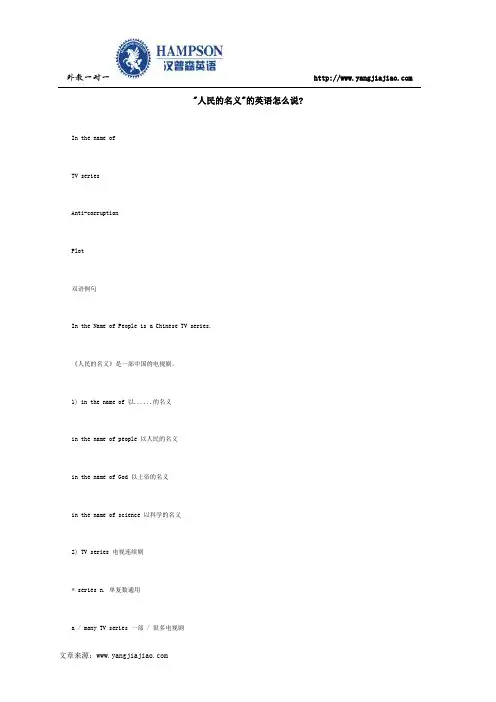
外教一对一"人民的名义"的英语怎么说?In the name ofTV seriesAnti-corruptionPlot双语例句In the Name of People is a Chinese TV series.《人民的名义》是一部中国的电视剧。
1) in the name of 以......的名义in the name of people 以人民的名义in the name of God 以上帝的名义in the name of science 以科学的名义2) TV series 电视连续剧* series n. 单复数通用a / many TV series 一部 / 很多电视剧外教一对一 Its plot revolves around a prosecutor's efforts to unearth corruption in a fictional Chinese city.该剧以一名检察官的调查行动为叙事主线来揭露一系列的贪污案件,该剧故事发生在中国一个虚拟城市。
3) plot n. 剧情4) revolve v. 旋转revolve around 围绕......展开,以......为中心5) unearth v.揭露,查出The show becomes an instant hit, drawing large audiences in China, where its release coincides with the government's anti-corruption campaign.该剧一播出就受到很多观众的追捧。
这部剧也正好赶上了政府这几年的大规模反腐运动。
6) hit n. 击打,非常流行的人/事* instant hit 瞬间即红The song is an instant hit.这首歌一经推出就深受欢迎。
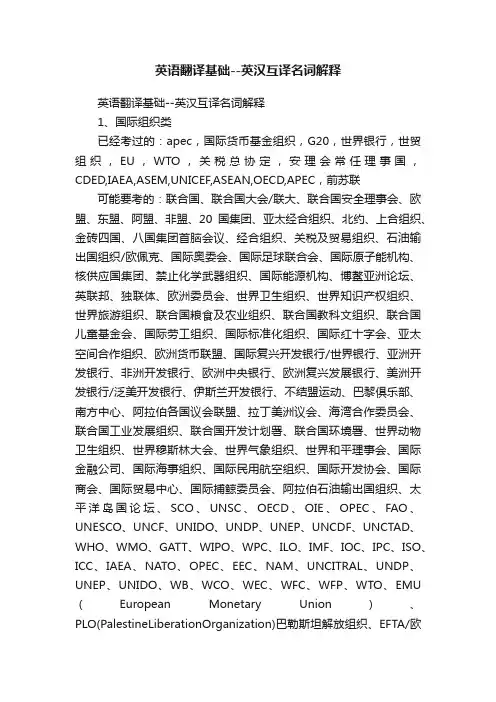
英语翻译基础--英汉互译名词解释英语翻译基础--英汉互译名词解释1、国际组织类已经考过的:apec,国际货币基金组织,G20,世界银行,世贸组织,EU,WTO,关税总协定,安理会常任理事国,CDED,IAEA,ASEM,UNICEF,ASEAN,OECD,APEC,前苏联可能要考的:联合国、联合国大会/联大、联合国安全理事会、欧盟、东盟、阿盟、非盟、20国集团、亚太经合组织、北约、上合组织、金砖四国、八国集团首脑会议、经合组织、关税及贸易组织、石油输出国组织/欧佩克、国际奥委会、国际足球联合会、国际原子能机构、核供应国集团、禁止化学武器组织、国际能源机构、博鳌亚洲论坛、英联邦、独联体、欧洲委员会、世界卫生组织、世界知识产权组织、世界旅游组织、联合国粮食及农业组织、联合国教科文组织、联合国儿童基金会、国际劳工组织、国际标准化组织、国际红十字会、亚太空间合作组织、欧洲货币联盟、国际复兴开发银行/世界银行、亚洲开发银行、非洲开发银行、欧洲中央银行、欧洲复兴发展银行、美洲开发银行/泛美开发银行、伊斯兰开发银行、不结盟运动、巴黎俱乐部、南方中心、阿拉伯各国议会联盟、拉丁美洲议会、海湾合作委员会、联合国工业发展组织、联合国开发计划署、联合国环境署、世界动物卫生组织、世界穆斯林大会、世界气象组织、世界和平理事会、国际金融公司、国际海事组织、国际民用航空组织、国际开发协会、国际商会、国际贸易中心、国际捕鲸委员会、阿拉伯石油输出国组织、太平洋岛国论坛、SCO、UNSC、OECD、OIE、OPEC、FAO、UNESCO、UNCF、UNIDO、UNDP、UNEP、UNCDF、UNCTAD、WHO、WMO、GATT、WIPO、WPC、ILO、IMF、IOC、IPC、ISO、ICC、IAEA、NATO、OPEC、EEC、NAM、UNCITRAL、UNDP、UNEP、UNIDO、WB、WCO、WEC、WFC、WFP、WTO、EMU (European Monetary Union)、PLO(PalestineLiberationOrganization)巴勒斯坦解放组织、EFTA/欧洲自由贸易联盟2、中国政府机关名词已经考过的:全国人民代表大会,政协,npc、可能要考的:主席团、常务委员会、办公厅、秘书处、中央军事委员会、最高人民法院、最高人民检察院、国务院、外交部、国防部、国家发展计划委员会、教育部、科学技术部、国家科学技术工业委员会、国家安全部、监察部、民政部、司法部、财政部、人事部、劳动和社会保障部、国土资源部、建设部、铁路部、交通部、信息产业部、水利部、农业部、对外贸易经济合作部、文化部、卫生部、国家计划生育委员会、中国人民银行、国家审计署、国务院办公厅、国务院研究室、新闻办公室、海关总署、国家税务总局、国家环境保护总局、中国民用航空总局、caac、国家广播电影电视总局、国家体育总局、国家统计局、国家工商行政管理局、新闻出版署、国家版权局、国家林业局、国家质量技术监督局、国家药品监督管理局、国家知识产权局、国家旅游局、新华通讯社、中国科学院、中国社会科学院、中国工程院、中国地震局、中国气象局、中国证券监督管理委员会、国家轻工业局、国家纺织工业局、国家海洋局、国家测绘局、国家外汇管理局、国家出入境检验检疫局、中国共产党中央委员会、中央政治局、CPPCC、中央政治局常务委员会、中央书记处、中央军事委员会、中央办公厅、中央组织部、中央宣传部、中央统一战线部、中央对外联络部、中央政策研究室、中央党校、中央翻译局、中央档案馆、中国人民政治协商会议、中国人民政治协商会议全国委员会、中国人民政治协商会议全国委员会常务委员会、中国共产党、中国国民党革命委员会(民革)、中国民主同盟(民盟)、中国民主建国会(民建)、中国民主促进会(民进)、九三学社3、美国《时代》周刊评出年度热词已经考过的:defacto,Neet,unfriend,somebody'scupoftea,givethefloorto,thein-thing,infortainment,可能要考的:Vuvuzela/呜呜祖拉、TopKill/JunkShot/StaticKill/T opHat顶部封杀/垃圾弹/静态封杀/盖帽法、深水地平线/DeepwaterHorizon、Bedbugs/臭虫、Eyjafjallajokull/冰岛火山、Austerity/节衣缩食/欧洲紧缩政策、AnchorBabies/定锚婴儿、MamaGrizzlies/棕熊妈妈军团、ReleasetheKraken/释放海妖、Double-dip/二次探底、Bungabunga/强行侵犯俘虏/意大利总理贝卢斯科尼举办的性派对、海地地震、维基解密、援救智利矿工、巴基斯坦特大洪灾、朝鲜半岛局势、也门/反恐战争新前线、基地组织、主权债务/sovereigndebt、实体经4、科技发明类已经考过的:HDTV,CPU,显示器,小排量汽车可能要考的:Semiconductor/半导体、5、近年重大疾病类已经考过的:CBS,TheGuardian,FIT,新华社、CCTV可能要考的:CBC、BBC、ABC、CNN、AP/Associated Press、美联社、路透社、全国广播公司(NBC )、哥伦比亚广播公司(CBS)、美国广播公司(ABC)、美国有线电视新闻网(CNN)、福克斯新闻频道(FOX NEWS)、日本广播协会(NHK)、半岛电视台(Al Jazeera)、加拿大广播公司(CBC)、澳大利亚广播公司(ABC)、东京广播公司(TBS)、韩国kbs电视台(KBS)、家庭影院频道(HBO)、[V]音乐台(channelv)、探索频道(discovery)、美国音乐电视频道(MTV)、NPR(National Public Radio)美国全国公共电台、7、美国之音常用新闻词汇已经考过的:commuter/乘车上班族、lipsynching/假唱、入境签证,Commuter,爵士摇滚,可能要考的:intangibleculturalheritage/非物质文化遗产、holdoff/保持距离、barrage/接连发问sound-detectiongear:声音探测器spam:垃圾邮件hideout:藏身点snap:仓促的coupplotter:政变策划者stemcell:干细胞playup:大肆渲染graffiti:涂鸦feverpitch:高度兴奋,狂热overstaff:人员过多peacesaboteur:和平破坏者comatose:昏迷的crackdown:取缔,制裁down-to-earth:实际的切实的BallisticMissileTest:弹道导弹试验Ordeal:严峻的考验Kidnapper:拐子、绑匪AtomicNucleus:原子核ConfidenceVote:信任票Denuclearization:非核化Blast:爆炸,冲击波GreenBeltMovement:绿带运动Argumentative:爱争论的Cram:塞满、拥挤SnapPoll:即席调查Premature:过早的,仓促的Paralyzed:瘫痪的LiftAnEmbargo:解除禁运Barbecuestoppage:中止;中断abstention:弃权clinicaltrial:临床试验ChrysanthemumThrone:天皇王位VaccinateBlockbusterMascotSleasyCULLOutofwhackhotwords:fie ldworkriotRedtape:繁文缛节ColdfrontAbduct:诱拐,绑架Preemptive:先发制人的Footage:电影胶片Incumbent:现任者,在职者MilitaryChief:军事最高统帅StateVisit:国事访问PermanentMember:常任理事国Relevance:意义,实用性UraniumEnrichment:铀浓缩PowerPlant:发电站Evacuate:撤退、疏散Bayard:骑士,勇武异常者launchpad:发射台Constituency:选区,选民atadiscountTabloidAchilles'heelPostmodernComeout (ofthecloset)Reggae Rap music Platonic Punk Blackball Coat tail Lame duck Independent counsel Preset Orbit:预定轨道Milestone:里程碑,转折点BallisticMissile:弹道导弹HeartBbypassSurgery:心脏搭桥手术Wail:大哭Denunciation:谴责、指责Holeup:藏匿StepDown:辞职,下台Benchmark:基准点,衡量标准BeakedWhale:突吻鲸,喙鲸Procurement:采购Handset:手机Stake:股份Portal:门户网站Showcase:展示Sedan:小轿车StrategicPetroleumReserve:战略石油储备BackT ax:退缴税CrudeOutput:原油生产LogOn:进入系统LagBehind:落在后面TeamUp:合作,协作AudienceRating:收视率PlayDown:对……不太重视FloorTrader:场内交易人APackageOfProposals:一揽子建议OperatingMargin:营运利润率Hedge-Fund:对冲基金Shortfall:不足、差额、赤字Anti-Trust:反托拉斯FullSwing:达到活动的ClawBack:夺回,费力收回BalanceSheet:资产负债表Inventory:货存、库存量MutualFund:共同基金LoanGuarante:借款保函ClassAction:集体诉讼Antidumping:反倾销Confetti:五彩纸屑FederalReserve:美国联邦储备系统Ink:签署(合同、文件等)HSBC:汇丰银行HotMoney:国际套利资本Scooter:速克达、踏板车、单脚滑行车InARow:一个接一个NetWorth:资本净值ABM=anti-ballisticmissile反弹道导弹abortivecoupattempt未遂政变absenttrial(absentvoting缺席审判(缺席投票absolutemajority绝对多数abstainfromvoting弃权abuseofpowerforpersonalgain以权谋私academia学术界academiccareer学历,学业academician院士AcademyAward奥斯卡金像奖academysciences科学院accreditedjournalist特派记者acquit (beacquitted宣告无罪(无罪释放actingpresident代总统activecapital流动资本activesubstance放射性物adversetradebalance逆差advisorybody顾问团after-saleservice售后服务aircrash飞机失事album专辑alliedpowers同盟国all-outban全面禁止all-roundtitle全能冠军alumnus(复数:alumni)校友amendment修正案,附加条款amicablerelations 友好关系amnesty特赦anarchy无政府状态animalyear本命年anti-corruption反腐败anti-robberybell防盗铃apartheid种族隔离appropriateauthorities有关当局arch-foe 主要的劲敌armedintervention武装干涉arm-twisting施加压力arson放火,纵火assemblyhall会议厅assemblyline生产流水线assemblyman议员,装配工assistantsecretary(美)助理部长assistantsecretaryofstate (美)助理国务卿attaché专员,(外交使团的)随员audiencerating收视率audiophile音乐发烧友authoritativeinformation官方消息authoritativesource权威人士autonomousregion(prefecture自治区(州axispower轴心国bachelormother未婚母亲backgroundbriefing吹风会,背景情况介绍会bacteria细菌bail 保释,保释金ballot选票,投票bankbook银行存折bankfailure银行倒闭barcode条形码bargainprice廉价beresponsibleforone'sownprofitandloss自负盈亏behonestinperformingone'sofficialduties廉洁奉公beeperBP 机behind-the-scenemaneuvering幕后操纵benefitconcert义演音乐会bestsupportingactressaward最佳女配角bidupprice哄抬物价biggun有势力的人,名人biglie大骗局bistro夜总会blackbox测谎器blackmarketprice 黑市价blanketballot全面选举blast爆炸blindalley死胡同blockade封锁bloodlesscoup不流血政变BlueBerets 蓝盔部队bluffdiplomacy恫吓外交bombard轰炸,炮击boom(经济)繁荣,兴旺borrower债方botanicalgarden 植物园bottleup抑制bottomout走出低谷boxofficereturns票房收入boxofficesmash卖座率高的演出boycott 联合抵制braindrain人才流失braingain人才引进braintrust智囊团brawndrain劳工外流read-and-butterletter 感谢信bribery行贿bubbleeconomy泡沫经济bureaucracy官僚主义bureaucrat官倒cabinetlineup内阁阵容cabinetre-shuffle内阁改组cablecar缆车cable-staybridge斜拉桥cadre干部cafeteria自助餐厅calamity灾难campaignagainstporns 扫黄运动candidateforexam考生cargohandlingcapacity货物吞吐量carnival狂欢节casualty遇难者,伤亡人员catchphrase口头禅,口号ceasefire停火ceilingprice最高限价celebrity知名人士cellularphone移动电话,大哥大censurevote不信任投票census人口普查ceremonialusherette迎宾小姐chamberconcert室内音乐会charity慈善组织charteredplane包机chinahand中国通China'sactualconditions 中国国情ChinesedescendantinAmerica 美籍华裔cholesterol胆固醇civilservant公务员civilian平民classroomboycott罢课climbout经济复苏closingaddress闭幕辞cloverleafintersection立交桥comfortably-offlevel小康水平complainsbox意见箱computernik电脑迷condo(minium)商品房condolence 慰问,吊唁conductedtour团体旅游confiscate没收,充公conscienceforum道德法庭conscript征兵,入伍conservativeparty保守党constructionofacleangovernment廉政建设conveniencefood方便食品corruptionreportingcenter举报中心countdown倒计时countymagistrate县长crammingsystem填鸭式教学法crashprogram应急计划criminallaw刑法crudeoil原油culturalundertakings文化事业curfew宵禁curriculumvitae履历表curtaincall谢幕dailynecessities日用品dailyturnover日成交量dan (围棋的)段deadlock 僵局deathtoll死亡人数,死亡率defendant 被告deli(catessen)熟食dictatorship独裁disaster-hitarea灾区discjockeyDJdissolve解散divisionchief处长,科长doctorialtutor 博士生导师doormoney入场费dove主和派,鸽派duet二重唱Duma(俄)杜马,俄罗斯议会dux学习标兵,学习尖子economicsanction经济制裁economictake-off经济腾飞ElNino厄尔尼诺现象electricpower电力eliminate淘汰embargo禁运enrouteto 在……途中enlistedman现役军人epidemic流行病exclusiveinterview独家采访expo(sition)博览会face-to-facetalk 会晤fairplaytrophy风格奖familyplanning计划生育fleamarket跳蚤市场flyingsquad飞虎队frame-up诬陷,假案frontpage头条frontrowseat首席记者fullhouse满座gear…totheinternationalconventions 把…与国际接轨grasswidow (widower留守女士(留守男士guestofhonor贵宾guestteam (hometeam客队(主队hawk主战派heroin海洛因highlightsandsidelights要闻与花絮his-and-herswatches情侣表hitparade 流行歌曲排行榜hitproduct拳头产品hit-and-runner肇事后逃走者HongKongcompatriot香港同胞honorguard 仪仗队hostage人质housingreform住房改革hypermedia多媒体ideology 意识形态idlemoney闲散资金inanotherrelateddevelopment另据报道incumbentmayor现任市长info-highway信息高速公路in-servicetraining在职训练inspector-general总监interimgovernment过渡政府invitationmeet邀请赛judo柔leadingactor男主角lease租约,租期manofmark名人,要人manuscript原稿,脚本marriagelines结婚证书masterkey万能钥匙medium媒体,媒介mercykilling安乐死moped助力车Moslem穆斯林multimedia多媒体musiccafe音乐茶座nationalanthem国歌negativevote反对票nestegg私房钱newsagency通讯社newsbriefing新闻发布会newsconference记者招待会newsflash短讯,快讯nominee候选人notions小商品nullandvoid无效的off-hourhobby业余爱好off-the-jobtraining脱产培训onstandby待命on-the-jobtraining在职培训on-the-spotbroadcasting现场直播opinionpoll民意测验overpass(人行)天桥overseasstudent留学生overture序曲overwhelmingmajority压倒性多数palmphone大哥大parliament国会passerby过路人pay-to-the-driverbus无人售票车peacefulco-existence和平共处peace-keepingforce维和部队peakviewingtime 黄金时间pedestrian行人pensioninsurance养老保险Pentagon五角大楼perk外快PM=primeminister首相,总理politburo政治局poorbox济贫箱pope教皇poseforagroupphoto 集体合影留念poverty-strickenarea贫困地区powerfailure断电,停电premiere首映,初次公演pressbriefing新闻发布会presscorps记者团pressspokesman新闻发言人prize-awardingceremony颁奖仪式professionalescort"三陪"服务profiteer投机倒把者protocol草案,协议puberty青春期publicservant公务员questionnaire调查表quick-frozenfood速冻食品quizgame智力竞赛racialdiscrimination种族歧视rapport默契reciprocalvisits互访recital独唱会,独奏会red-carpetwelcome隆重欢迎red-hotnews 最新消息red-letterday大喜之日redundant下岗人员re-employment再就业rep=representative代表ripoff宰客senate参议院tenureofoffice任职期theotherman (woman第三者topnews 头条新闻tornado龙卷风tourdeforce代表作townshipenterprises 乡镇企业townshiphead乡长traffictie-up交通瘫痪truce停火,休战trustee董事two-daydayoffs双休日tycoon巨富umpire裁判V.D.=venerealdisease性病vaccine疫苗vehicle-freepromenade步行街votedown否决well-offlevel 小康水平well-to-dolevel小康水平Who'sWho名人录workingcouple双职工8、国际贸易类已经考过的:installment plan,chenck and balance,boned good,优惠合同,购货合同,报关,贸易顺差,售后服务,安检,POD,L(C,bonded warehouse,转基因食品,可能要考的:9、金融危机相关词汇已经考过的:IPR,Sub-prime Mortgage Crisis,Free Trade Agreement,稳健的货币政策,可能要考的:10、大陆对台政策类已经考过的:CEPA,可能要考的:一国两制、11、中国航天事业类已经考过的:载人航天计划,载人飞船可能要考的:12、美国机构类已经考过的:NASA,USNE,美国联邦储备银行,奥巴马、奥斯卡奖、花旗银行,Arbor Day,可能要考的:ANSI(美国国家标准学会、美利坚合众国、USDA、ACM、USNA、NSC、USMA、AMA、ABA (American Bar Association美国律师协会、ECMA(European Computer Manufacturers Association欧洲计算机制造商协会、IDC (International Data Corporation国际数据公司、NAS(National Academy of Sciences国家科学院、AAA(American Automobile Association美国汽车协会、ABA(American Bankers Association 美国银行家协会、ARC(American Red Cross美国红十字会、IATA (International Air Transport Association国际航空运输协会DA (Department of the Army (美国)陆军部、OSS(Office ofStrategic Services战略情报局、NMD/国家导弹防御系统、13、全球著名快递公司已经考过的:EMS、14、全球航空公司已经考过的:BA(British Airways英国航空公司可能要考的:CAB(Civil Aeronautics Board民航局、AAL (American Airlines美国航空公司、AA(American Airlines 美国美洲航空、15、全球著名企业已经考过的:可能要考的:HP(Hewlett-Packard惠普公司、GM(General Motors美国通用汽车公司、16、各国缩写已经考过的:可能要考的:CAN加拿大SP西班牙IR伊朗PE(Peru秘鲁IRE (Ireland爱尔兰AR(Argentina阿根廷JP(Japan 日本、SFO(San Francisco三藩市、16、各国央行及全球著名银行已经考过的:中国工商银行,可能要考的:ECB(European Central Bank欧洲中央银行、17、全球证交所已经考过的:NSDAQ、创业板,可能要考的:ASE美国证券交易所、SEX((Singapore Stock Exchange)新加坡证券交易所、SSE(上海证券交易所)、ASX澳大利亚证券交易所Australian Stock Exchange、纳斯达克,道.琼斯,香港恒生,东京证券交易所,18、全球运动协会缩写已经考过的:NBA可能要考的:AHL(American Hockey League)美国曲棍球联盟、MLB(Major League Baseball)美国全国棒球协会和盟国棒球协会、NBA(美国)国家篮球协会、NHL(National Hockey League)全国曲棍球联盟、WWF(World Wrestling Federation)世界摔角联盟、CBA、19、中国特色的词汇已经考过的:中国特色的社会主义市场经济,外向型经济,政企分开,恶性循环,自负盈亏,扫黄打非,西部大开发,高度自治,中小企业,打造知名品牌,晚婚晚育,可能要考的:20、百科全书已经考过的:Encyclopedia Britannica, binary opposition,可能要考的:21、古代巨著已经考过的:《论语》《红楼梦》《红楼梦》《毛泽东语录》《论语》《钦定圣经》、可能要考的:水浒、三国、西游记、一千零一夜、天方夜谈、道德经、TAO,孔子、孟子、22、军事外交类已经考过的:外交庇护,战略伙伴关系,Special Safeguard Mechanism,可能要考的:23、节能减排、气候大会已经考过的:节能,温室气体排放可能要考的:24、中国网络热词已经考过的:选秀,囧,绿坝,SOHO、可能要考的:25、中国成语可能要考的:26、中国自然灾害已经考过的:地震,可能要考的:27、中国名盛古迹已经考过的:颐和园,天坛、兵马俑,可能要考的:28、翻译专业述语已经考过的:音译、对等翻译、direct Translation,MTI,Simultaneous Interpretion,会议传译,应用语言学,可能要考的:29、节日已经考过的:老人节,Arbor Day,可能要考的:30、中国特色的评选已经考过的:中国十佳宜居城市可能要考的:31、科技类已经考过的:the king of kings, Dubbling,文本对等,可能要考的:。
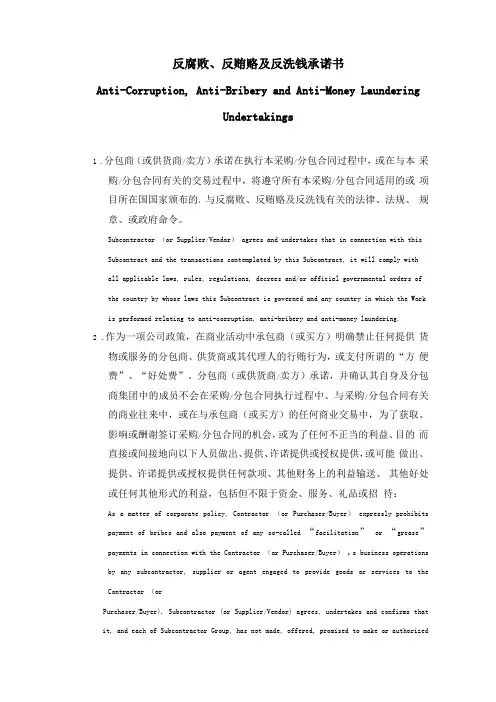
反腐败、反贿赂及反洗钱承诺书Anti-Corruption, Anti-Bribery and Anti-Money LaunderingUndertakings1.分包商(或供货商/卖方)承诺在执行本采购/分包合同过程中,或在与本采购/分包合同有关的交易过程中,将遵守所有本采购/分包合同适用的或项目所在国国家颁布的,与反腐败、反贿赂及反洗钱有关的法律、法规、规章、或政府命令。
Subcontractor (or Supplier/Vendor) agrees and undertakes that in connection with this Subcontract and the transactions contemplated by this Subcontract, it will comply with all applicable laws, rules, regulations, decrees and/or official governmental orders of the country by whose laws this Subcontract is governed and any country in which the Work is performed relating to anti-corruption, anti-bribery and anti-money laundering.2.作为一项公司政策,在商业活动中承包商(或买方)明确禁止任何提供货物或服务的分包商、供货商或其代理人的行贿行为,或支付所谓的“方便费”、“好处费”。
分包商(或供货商/卖方)承诺,并确认其自身及分包商集团中的成员不会在采购/分包合同执行过程中、与采购/分包合同有关的商业往来中,或在与承包商(或买方)的任何商业交易中,为了获取、影响或酬谢签订采购/分包合同的机会,或为了任何不正当的利益、目的而直接或间接地向以下人员做出、提供、许诺提供或授权提供,或可能做出、提供、许诺提供或授权提供任何款项、其他财务上的利益输送、其他好处或任何其他形式的利益,包括但不限于资金、服务、礼品或招待:As a matter of corporate policy, Contractor (or Purchaser/Buyer)expressly prohibits payment of bribes and also payment of any so-called “facilitation” or “grease”payments in connection with the Contractor (or Purchaser/Buyer),s business operations by any subcontractor, supplier or agent engaged to provide goods or services to the Contractor (orPurchaser/Buyer). Subcontractor (or Supplier/Vendor) agrees, undertakes and confirms that it, and each of Subcontractor Group, has not made, offered, promised to make or authorizedthe making of, and will not make, offer, or promise to make, or authorize the making of, any payment or other transfer of any financial or other advantage or anything else of value, including without limitation the provision of any funds, services, gifts or entertainment, directly or indirectly to:-(a)任何政府官员;any government official;(b)任职于承包商(或买方)实际的或可能的合作方的董事、高级管理人员、雇员、代理/代表,或承包商(或买方)的客户;any director, officer, employee or agent/representative of an actual or prospective counterparty, supplier or customer of the Contractor (or Purchaser/Buyer) (“Counterparty”);(c)任职于承包商(或买方)集团成员的董事、高级职员、雇员或代理人;anydirector, officer, employee or agent of any member of Contractor (or Purchaser/Buyer) Group;(d)任何政治团体、政治团体的工作人员或公职人员的候选人;any political party, official of a political party, or candidate for public office; (e)为了向前述人员行贿而通过的代理人或中间人;any agent or intermediary for payment to any of the foregoing; or(f)任何其他人员any other Person,如果目的是在采购/分包合同执行过程中、与采购/分包合同有关的商业往来中,或在与承包商的任何商业交易中,获取、影响或酬谢采购/分包合同授标,或为了任何不正当的利益、目的,如果分包商(或供货商卖方) 的行为违反了任何适用于承包商(或买方)或分包商(或供货商/卖方) 的反贿赂或反洗钱法律规范的要求。
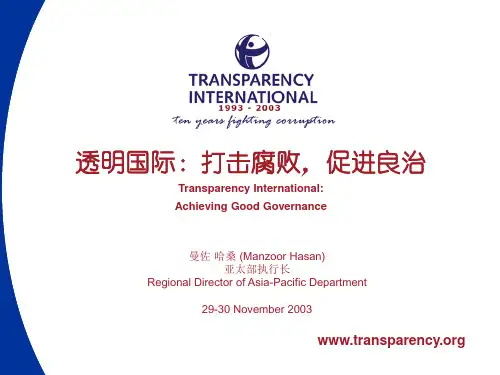
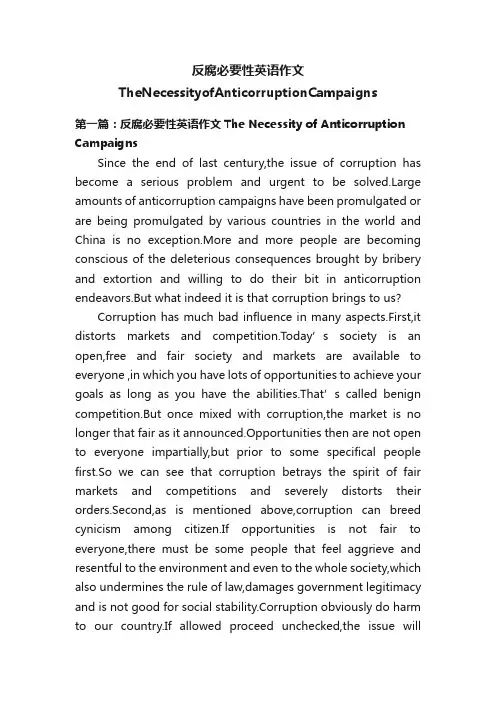
反腐必要性英语作文TheNecessityofAnticorruptionCampaigns第一篇:反腐必要性英语作文The Necessity of Anticorruption CampaignsSince the end of last century,the issue of corruption has become a serious problem and urgent to be rge amounts of anticorruption campaigns have been promulgated or are being promulgated by various countries in the world and China is no exception.More and more people are becoming conscious of the deleterious consequences brought by bribery and extortion and willing to do their bit in anticorruption endeavors.But what indeed it is that corruption brings to us?Corruption has much bad influence in many aspects.First,it distorts markets and competition.Today’s society is an open,free and fair society and markets are available to everyone ,in which you have lots of opportunities to achieve your goals as long as you have the abilities.That’s called benign competition.But once mixed with corruption,the market is no longer that fair as it announced.Opportunities then are not open to everyone impartially,but prior to some specifical people first.So we can see that corruption betrays the spirit of fair markets and competitions and severely distorts their orders.Second,as is mentioned above,corruption can breed cynicism among citizen.If opportunities is not fair to everyone,there must be some people that feel aggrieve and resentful to the environment and even to the whole society,which also undermines the rule of law,damages government legitimacy and is not good for social stability.Corruption obviously do harm to our country.If allowed proceed unchecked,the issue willundoubted be more ad more rampant and ultimately become uncontrolled,which will finally lead a country to an end.From what have been mentioned above,it is therefore necessary that some effective measures are taken to prevent ernment should launch more anticorruption campaigns,to enhance public awareness and commitment to combating graft and curbing ernment also should reinforce the momentum of the anticorruption drive and show no mercy to the corrupt officials.Only in this way,corruption will be controlled and won’t be so rampant as it is now.第二篇:2016考研英语作文预测:反腐/kaoyan/2016考研作文预测:反腐Directions: Write an essay of 160-200 words based on the following drawing.In your essay, you should1)describe the drawing briefly,2)interpret its social meaning3)and give your comments.You should write about 200 words neatly on ANSWER SHEET 2.(20 points)大家在写作文前可以复习一下“腐败”相关的词汇:一、“腐败”相关词汇1、rotn.腐烂,腐朽;vt.& vi.(使)腐烂,(使)腐朽How can we stop the rot in our society? Don’t talk rot!我们怎样才能制止社会的腐败呢?不要胡说。
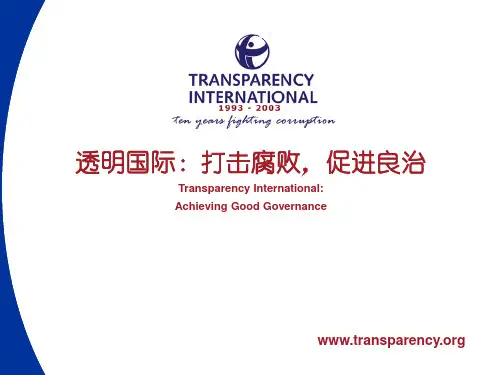

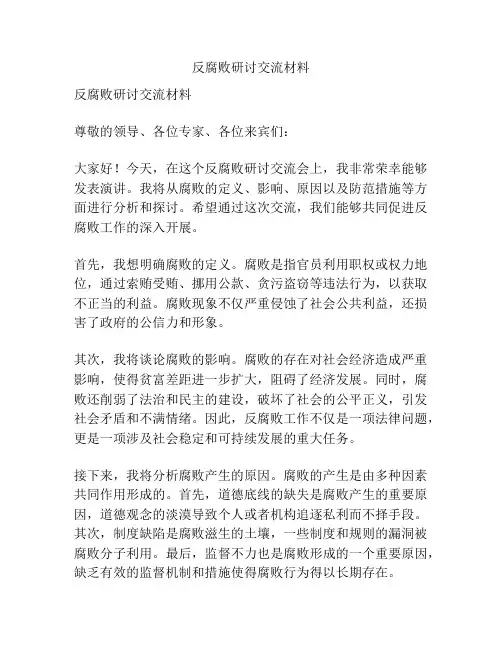
反腐败研讨交流材料反腐败研讨交流材料尊敬的领导、各位专家、各位来宾们:大家好!今天,在这个反腐败研讨交流会上,我非常荣幸能够发表演讲。
我将从腐败的定义、影响、原因以及防范措施等方面进行分析和探讨。
希望通过这次交流,我们能够共同促进反腐败工作的深入开展。
首先,我想明确腐败的定义。
腐败是指官员利用职权或权力地位,通过索贿受贿、挪用公款、贪污盗窃等违法行为,以获取不正当的利益。
腐败现象不仅严重侵蚀了社会公共利益,还损害了政府的公信力和形象。
其次,我将谈论腐败的影响。
腐败的存在对社会经济造成严重影响,使得贫富差距进一步扩大,阻碍了经济发展。
同时,腐败还削弱了法治和民主的建设,破坏了社会的公平正义,引发社会矛盾和不满情绪。
因此,反腐败工作不仅是一项法律问题,更是一项涉及社会稳定和可持续发展的重大任务。
接下来,我将分析腐败产生的原因。
腐败的产生是由多种因素共同作用形成的。
首先,道德底线的缺失是腐败产生的重要原因,道德观念的淡漠导致个人或者机构追逐私利而不择手段。
其次,制度缺陷是腐败滋生的土壤,一些制度和规则的漏洞被腐败分子利用。
最后,监督不力也是腐败形成的一个重要原因,缺乏有效的监督机制和措施使得腐败行为得以长期存在。
最后,我将探讨反腐败的防范措施。
首先,加强法治建设。
建立健全的法律体系,加强立法的科学性和完善性,保证法律的公正执行。
其次,加强制度建设。
完善政府机构和部门间的协作机制,推动政府行政经济的透明化,提高制度的灵活性和有效性,减少腐败空间。
最后,加强监督机制建设。
建立有效的监督体系,加强对公职人员的监督力度,加强舆情监测和反馈,及时发现和解决问题。
在教育方面,加强公民道德教育,培养公民的法治意识和道德观念,提高公众对腐败的认识和抵制能力。
在培养公职人员方面,加强职业道德教育和规范培训,强化对公职人员的法制和职责教育,树立正确的职业操守。
总之,反腐败工作是一个复杂而艰巨的任务。
我们必须全面认识腐败的定义、影响、原因以及防范措施,并采取一系列有效的措施来彻底根除腐败现象。
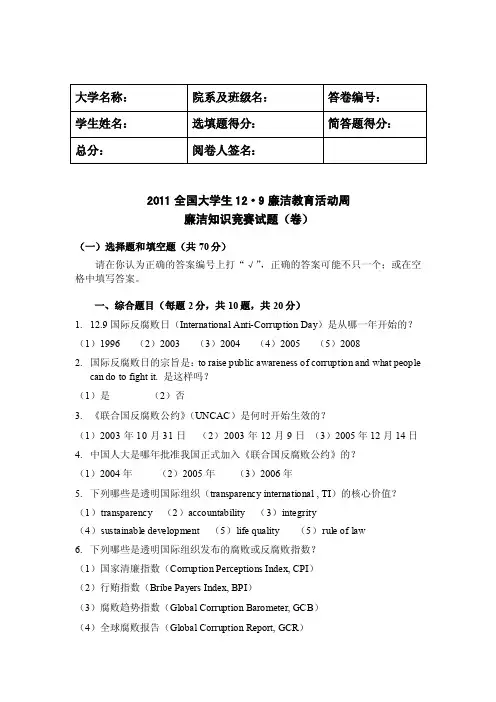
大学名称:院系及班级名:答卷编号:学生姓名:选填题得分:简答题得分:总分:阅卷人签名:2011全国大学生12·9廉洁教育活动周廉洁知识竞赛试题(卷)(一)选择题和填空题(共70分)请在你认为正确的答案编号上打“√”,正确的答案可能不只一个;或在空格中填写答案。
一、综合题目(每题2分,共10题,共20分)1.12.9国际反腐败日(International Anti-Corruption Day)是从哪一年开始的?(1)1996 (2)2003 (3)2004 (4)2005 (5)20082.国际反腐败日的宗旨是:to raise public awareness of corruption and what peoplecan do to fight it. 是这样吗?(1)是(2)否3.《联合国反腐败公约》(UNCAC)是何时开始生效的?(1)2003年10月31日(2)2003年12月9日(3)2005年12月14日4.中国人大是哪年批准我国正式加入《联合国反腐败公约》的?(1)2004年(2)2005年(3)2006年5.下列哪些是透明国际组织(transparency international , TI)的核心价值?(1)transparency (2)accountability (3)integrity(4)sustainable development (5)life quality (5)rule of law6.下列哪些是透明国际组织发布的腐败或反腐败指数?(1)国家清廉指数(Corruption Perceptions Index, CPI)(2)行贿指数(Bribe Payers Index, BPI)(3)腐败趋势指数(Global Corruption Barometer, GCB)(4)全球腐败报告(Global Corruption Report, GCR)7.致力于廉洁教育的国际民间组织Tiri的口号是making integrity work, 是吗?(1)是(2)否8.反腐败国际合作的基本模式有哪些?(1)双边合作(2)多变或地区合作(3)全球合作9.我国于2010年12月29日向国际社会正式发表了首个反腐败白皮书,该白皮书的正式名称是:《中国的和》。
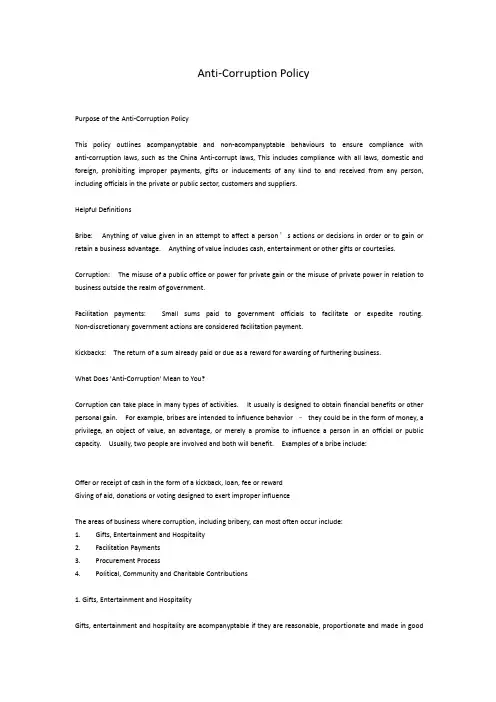
Anti-Corruption PolicyPurpose of the Anti-Corruption PolicyThis policy outlines acompanyptable and non-acompanyptable behaviours to ensure compliance with anti-corruption laws,such as the China Anti-corrupt laws,This includes compliance with all laws,domestic and foreign,prohibiting improper payments,gifts or inducements of any kind to and received from any person, including officials in the private or public sector,customers and suppliers.Helpful DefinitionsBribe:Anything of value given in an attempt to affect a person’s actions or decisions in order or to gain or retain a business advantage.Anything of value includes cash,entertainment or other gifts or courtesies.Corruption:The misuse of a public office or power for private gain or the misuse of private power in relation to business outside the realm of government.Facilitation payments:Small sums paid to government officials to facilitate or expedite routing. Non-discretionary government actions are considered facilitation payment.Kickbacks:The return of a sum already paid or due as a reward for awarding of furthering business.What Does'Anti-Corruption'Mean to You?Corruption can take place in many types of activities.It usually is designed to obtain financial benefits or other personal gain.For example,bribes are intended to influence behavior–they could be in the form of money,a privilege,an object of value,an advantage,or merely a promise to influence a person in an official or public ually,two people are involved and both will benefit.Examples of a bribe include:Offer or receipt of cash in the form of a kickback,loan,fee or rewardGiving of aid,donations or voting designed to exert improper influenceThe areas of business where corruption,including bribery,can most often occur include:1.Gifts,Entertainment and Hospitality2.Facilitation Payments3.Procurement Process4.Political,Community and Charitable Contributions1.Gifts,Entertainment and HospitalityGifts,entertainment and hospitality are acompanyptable if they are reasonable,proportionate and made in goodfaith and in compliance with our company policies.These activities must be in compliance with our Code of Business Conduct(guiding principle:‘avoiding conflicts of interest’),Customer Entertainment Policy and Corporate Hospitality Guidelines.Although no two situations are the same,the Corporate Hospitality Guidelines define what is usually acompanyptable and what is never acompanyptable.Examples of gifts,entertainment and hospitality include the receipt or offer of gifts,meals or tokens of appreciation and gratitude,invitations to events,functions,or other social gatherings,in connection with matters related to our business.These activities are acompanyptable provided they fall within reasonable bounds of value and occurrence.How do you know if an offered gift,entertainment or hospitality is acompanyptable?First,take a step back and ask yourself the following:What is the intent–is it to build a relationship or is it something else?How would it look if these details were on the front of a newspaper?What if the situation were reversed–would there be a double standard?If you find it difficult to provide a comfortable answer to one of the above questions,ASK your manager,local Legal Department or the Ethics and Compliance Office.What to do when you doubt if you can acompanypt?If you are unsure if you should acompanypt something of value–ASK.Ask your manager.If your manager is participating,seek a higher-level manager.If you prefer, ask your local Legal Department or contact the Ethics and Compliance Office.As a general rule,employees and business partners should not provide gifts or hospitality to,or receive them from,a government or other public official(or their close families and business associates).You may give a modest gift to these parties when appropriate and allowed by local law provided you discussed it with and received written approval in advance from the legal department.Please refer to our Code of Business Conduct,“Engaging in Government and Political Activities”which allows political contributions as permitted by law and only when approved in advance by our senior public affairs officer and legal counsel.2.Facilitation PaymentsFacilitation payments are not allowed.If you are unsure whether certain payments represent facilitation payments,please contact your local Legal Officer,or the Ethics and Compliance Office.3.Procurement ProcessYou must follow company processes and adhere to the system of internal controls around supplier selection. Supplier selection should never be based on receipt of a gift,hospitality or payment.When supplier selection is a formal,structured invitation for the supply of products or services(often called a‘tender’),it is most important we maintain documentation supporting our internal controls.In the public sector,such a tender process may be required and determined in detail by law to ensure that such competition for the use of public money is open,fair and free from corruption.A tender process includes an invitation for other parties to make a proposal,on the understanding that any competition for the relevant contract must be conducted in response to the tender,no parties having the unfair advantage of separate,prior,closed-door negotiations for the contract where a bidding process is open to all qualified bidders and where the sealed bids are in the open for scrutiny and are chosen on the basis of price and quality.4.Political Community and Charitable ContributionsYou are not allowed to make political contributions from Company funds without authorization.Political contributions,as permitted by law,must be approved in advance by our senior public affairs officer and legal counsel.Importantly,company is not permitted to make political contributions in France,Belgium or Great Britain.Contributions made by company to community projects or charities need to be made in good faith and in compliance with our Code of Business Conduct,this Anti-Corruption Policy and all relevant company’s policies and procedures.Books,Records and Internal Control RequirementsExpenses must never be hidden or purposefully misclassified.Many serious global bribery and corruption scenarios are found to involve inaccurate record-keeping.To prevent this,international anti-corruption laws generally require detailed and accurate accounting records for transactions,including cash and bank accounts. We must ensure we maintain accurate books,records and financial reporting.All business units must maintain an effective system of internal control and monitoring of our transactions. Certain monitoring controls are identified in our policies,specifically regarding approval of travel and entertainment expenses.It is your responsibility to be knowledgeable of control procedures and ensure compliance.You Are Responsiblecompany takes corruption and bribery very seriously.Any violation of this policy will be regarded as a serious matter by the Company and is likely to result in disciplinary action,including termination,consistent with local law.Bribery is a criminal offense.As an employee you will be accountable whether you pay a bribe yourself or whether you authorize,assist,or conspire with someone else to violate an anti-corruption or anti-bribery law. Punishment for violating the law are against you as an individual and may include imprisonment,probation, mandated community service and significant monetary fines which will not be paid by company.Questions or How to Raise a ConcernIf you want to ask a question about the requirements in this policy or are concerned that an anti-corruption violation is occurring or has occurred,report it immediately to one of the following:Your managerYour local Legal DepartmentEthics and Compliance Office,directly by contacting T.J.Wolfe,VP Compliance&Risk;or email at: ethics@Refer to the Ethics and Compliance website for anonymous reporting procedures.Policy OwnershipThis Policy is owned by company’s legal department.Please contact your local legal department or the Ethics& Compliance Office for any questions,or send an email to Ethics@The policies on this site apply to all employees of Huixiang Enterprises and Huixiang Enterprises subsidiaries unless otherwise specified or as required by Federal,National,Country,State or Local law or Collective Bargaining Agreement.。
反腐巡视anti-graft inspectionChina will send anti-corruption inspectors to centrally-administrated universities, discipline authority of the Communist Party of China (CPC)announced Wednesday. The anti-graft inspections will scrutinize Party committees of 29 universities.中共纪律部门22日宣布,将向中管高校派出反腐巡视组。
本轮反腐巡视将对29所高校党委进行详查。
22日,十八届中央第十二轮巡视(the 12th round of inspections)工作动员部署会在北京召开,这将是十九大召开前的最后一轮巡视,本轮巡视完毕后将实现十八届任期内中央巡视的全覆盖,因此意义非凡。
经中央批准,第十二轮巡视将对北京大学、清华大学、北京师范大学等29所中管高校党委(Party committees of 29 centrally-administrated universities)开展专项巡视。
同时,对内蒙古、吉林、云南、陕西4个省区开展"回头看"(re-examine the work of the Inner Mongolia autonomous region as well as Jilin, Yunnan and Shaanxi provinces),对中共中央网络安全和信息化领导小组办公室(the Office of the Central Leading Group for Cyberspace Affairs)、国务院扶贫开发领导小组办公室(the State Council Leading Group Office of Poverty Alleviation and Development)、中国铁路总公司(China Railway Corporation)、中国船舶重工集团公司(China Shipbuilding Industry Corporation)4个单位试点开展"机动式"巡视(launch flexible inspections)。
沃尔夫斯堡的反贪污腐败声明沃尔夫斯堡组织1联同透明国际(Transparency International)及巴塞尔公司治理研究院(Basel Institute on Governance)作出以下声明,更清楚阐述沃尔夫斯堡组织和金融机构在支持国际合作打击贪污腐败事宜上所担任的角色,并提出金融机构可考虑的一些措施,避免在本身的运作中出现贪污腐败,以及保护本身的业务运作免被用作进行贪污腐败活动。
鉴于种种发展,包括《联合国反腐败公约》于2005年12月9日生效,而该公约是附加于现时有关打击贪污腐败的跨国性和国家法律的重要条约2,沃尔夫斯堡组织决定在此时作出反贪污腐败声明。
《联合国反腐败公约》的序言明确阐述贪污腐败破坏法治、民主体制与人类的基本自由、威胁国家的稳定与发展,以及损害自由贸易与公平竞争。
此外,贪污腐败也会降低投资和融资水平及其效用,尤其是在经济环境较差的社会。
1. 序言虽然没有单一定义可以详尽说明什么是贪污腐败,但贪污腐败行为通常涉及滥用公职或利用公职权力来谋取私利,通过提供或许诺给予任何贵重物品(不论直接或间接)给任何公职人员或政治候选人、政党或政党人员,以获得、保留或得以经营业务或者在经营过程中取得任何其他不正当利益。
相反,贪污腐败亦可能是要求任何人士给予或接受任何人士的贵重物品,作为(不论直接或间接)给予业务交易或其他不正当利益的条件。
贪污腐败通常与有组织犯罪、清洗黑錢活动相连,有时甚至与资助恐怖活动有关。
打击贪污腐败必须以全面、多方合作的方式由各国和本国政府部门和执法机关领导进行,并需要民间团体和工商界协助。
沃尔夫斯堡组织各成员全力参与打击贪污腐败,反对一切贪污腐败行为,并承诺遵守各项打击贪污腐败的法律。
沃尔夫斯堡组织各成员之间将会合力打击贪污腐败,力求配合对有关金融机构具有司法管辖权的政府,以及该金融机构认为适当的其他公共和私营机构、组织和民间团体所进行的打击贪污腐败工作。
沃尔夫斯堡组织各成员均了解到,可能会有人利用其机构支付贿款或清洗黑錢,故认为有需要采取切实可行的措施以免机构被滥用。
In the contemporary world, the scourge of corruption has become a pervasive issue that affects the very fabric of society. As a high school student, I have been deeply affected by the stories and instances of corruption that have surfaced in various sectors, from politics to business. This essay aims to explore the impact of corruption, the importance of combating it, and the role that individuals like myself can play in this fight.Growing up, I was always aware of the term corruption but its gravity only struck me when I read about a case in our local news. It involved a highranking official who was caught in a bribery scandal, which led to the misallocation of funds meant for public infrastructure. This incident not only tarnished the reputation of the official but also resulted in the delay of muchneeded development projects in our community. The realization that corruption could have such tangible and detrimental effects on the lives of ordinary citizens was a turning point for me.The impact of corruption is farreaching. It undermines the rule of law, erodes public trust in institutions, and diverts resources away from essential services like healthcare and education. In many developing countries, corruption is a significant barrier to economic growth and poverty alleviation. It is a form of theft, where the corrupt individuals benefit at the expense of the many. For instance, a report by Transparency International revealed that the global cost of corruption is estimated to be at least 5% of the worlds GDP, which translates to trillions of dollars that could have been used for the betterment of society.Combating corruption requires a multifaceted approach. It involvesstrengthening legal frameworks, promoting transparency and accountability in government and business practices, and fostering a culture of integrity. One of the most effective ways to fight corruption is through education. By teaching young people about the consequences of corruption and the importance of ethical behavior, we can cultivate a generation that values honesty and fairness.As a high school student, I believe that I can contribute to the fight against corruption in several ways. Firstly, I can be an advocate for transparency and integrity within my school community. By encouraging my peers to be honest and to report any instances of dishonesty, I can help create an environment where corruption is not tolerated. Secondly, I can stay informed about current events and engage in discussions about corruption with my family and friends. This not only raises awareness but also helps to debunk any misconceptions about the issue.Moreover, I can participate in community initiatives that aim to combat corruption. For example, volunteering with organizations that promote good governance and transparency can provide me with practical experience and a deeper understanding of the challenges involved in this fight. Lastly, as I prepare for my future career, I can choose to work in fields where I can make a positive impact and contribute to the eradication of corruption.In conclusion, corruption is a complex and deeply rooted problem that requires the collective effort of individuals, communities, and governments to overcome. As a high school student, I am committed to playing my partin this fight by promoting integrity, raising awareness, and contributing to initiatives that aim to combat corruption. It is my hope that through our collective efforts, we can create a world where corruption is a thing of the past, and where the benefits of development and progress are shared by all.。
国外学者对反腐的研究现状第一篇:国外学者对反腐的研究现状国外研究现状国外学者的研究主要集中在对反腐的基础理论研究,对腐败可能产生的影响的研究,同时还有影响腐败的方面,以及探究如何进行反腐更为有效。
研究更多体现在廉政建设上,类似于政权选举,立法呼吁、草根公民的努力、新闻媒体的作用等。
而对于网络反腐这块的研究甚少,只基于网络作为其工具可采纳使用为反腐服务。
(一)对反腐的基础理论研究:Diana Schmidt(2007)认为反腐有四个至关重要的时期:(1)学术争论早其对腐败的争论(pre-1990年代);(2)初始反腐败辩论(1990年代);(3)一段时间的重新定位(2000年代早1期);(4)最新的反腐败辩论(2000年代)。
Mccoy J.L.(2001)则分析了全球反腐败规范的形成,特别是对其反贿赂元素的分析,自1990年代起经历了三个阶段:(1)提高认识,(2)制度化2发展而来的法律和政策工具,和(3)全球采纳、内化和依从性。
Roger Tangri and Andrew M.Mwenda(2006)则提供证据表明,腐败已经发生在以下这些领域的改革等,如私有化(Tangri & Mwenda 2001),公共采购、政府收入收集(Fjeldstad et3al.2003),议会和总统选举。
(二)对抑制反腐的措施的研究Klaus Abbink(2004)提到在德国联邦政府正式职工旋转是一种在公共管理下反对腐败的预防措施。
反对腐败的措施之一是让正式的职工进行职位调换,而旋转的作用是能显著降低贿赂的频率及因贿赂而产生的低效4。
Anne Marie Goetz(2007)则通过研究发现,妇女成为反腐的新力量之一,因统计证据表明那些在政治上和劳动力上拥有更多数量为妇女的国家存在更低的腐败程度5。
Leonid Peisakhin and Paul Pinto(2006)则提出信息公开的必要性是防治腐败的有力举措之一。
反腐败斗争(Anti Corruption Campaign)
Corruption cases are frequently reported by news media. For example, some high ranking officials help themselves to state fund (公款) illegally. For another example, some leaders abuse power (滥用权力). What's more, malpractice(玩忽职守,渎职), bribery (贿赂) and other corrupt behaviour do much harm. As a result, the healthy development of the economy is seriously affected.
As China continues its reforms and opens wider to the outside world, anti corruption is a question of priorities. Our government has realized the seriousness of corruption problems. Corruption presents a dreadful threat to state interests. Corruption cases seriously damage efforts to build a clean and honest government, undoubtedly dampen(泼冷水,挫伤) people's enthusiasm(热情) and heavily affect stability(稳定).
In the future, to cement (巩固) the fruits that reform has borne, an even greater effort is needed in the battle against corrupt behaviour. Governments at all levels should take more effective measures to combat corruption. Laws already in effect must be strictly enforced (执行). The implementation (实施) of anti corruption programs should target every part of China. Anti corruption agencies should intensify crackdown (增强打击力度) on bribery, attach greater importance to the anti corruption campaign。